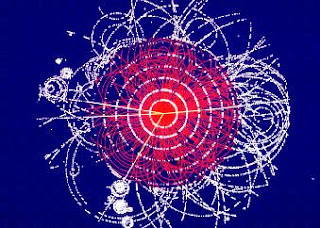What a time to be a Physicist!

*
My childhood dream was becoming a radio-astronomer. My high school dream was becoming a theoretical physicist, after reading Stephan Hawking's A Brief History of Time. I ended up a electrical engineer, but I try to nurture my childhood dreams by following the developments on both fields. It's been said that these days are the best days to be a physicist since the days of Einstein. The reason for this excitement is the Large Hadron Collider which will be operational this month in CERN, Switzerland. The largest particle collider ever built, the largest scientific instrument as a matter of fact, accelerates fundamental particles to near speed of light speeds and collide them, and observe the wreck.
The biggest problem in physics today is a very fundamental one. Why do particles have mass? In the beginning there was only light, or energy, which are carried by massless photons. Somehow all this massless energy ended up having mass, and that is how I am writing this entry, and you are reading it. What causes elementary particles to have mass is a very fascinating question.
This question gained more importance as weak force -the force that is responsible for radioactivity- and electromagnetism were united theoretically in the 70s. The weak force is result of particles exchanging W and Z particles, where as electromagnetism is a result of exchanging photons. The mathematical description of these two forces show a symmetry. However W and Z particles, which were observed 20 years after the theory predicted them, are 200 times more heavy than electrons, whereas photons are massless. What causes one particle to have mass? The theorists propose a field that exist all around in the universe which interact with these particles that give them mass. This field is named the Higgs field. As with all other fields, Higgs field has a corresponding Higgs particle, which is theorized to have a huge mass. The physicists hope to observe this Higgs particle in LHC, which would complete the standard theory. Next steps then would be integrating strong force, that keeps atoms together, and perhaps gravity, to have a theory of everything. The discovery of Higgs boson has affects on cosmology too, as we would be able to describe the first moments of the cosmos which lead to matter having mass.
I hope my dear friend Björn is having a great time with his PHD in physics!
Interested can read these one page explanations of why Higgs boson is so important, or these more detailed explanations.
*The simulated traces of Higgs boson after colliding protons.
Comments
Hawking Radiation theory is fundamentally flawed according to several peer reviewed studies. Safety is not proven. Study LHCFacts.org and/or LHCDefense.org.
Not a single required safety argument has been verified with respect to the danger of micro black holes.
fyi: Cosmic rays that strike Earth send results through the planet at nearly the speed of light. Powerful magnetic fields protect neutron stars from charged cosmic rays. The safety argument was called unverified by CERN's SPC Committee.
I have heard from extremely few physicists that comprehend the unsettle nature of the safety arguments. Operating this experiment before confirmation of safety arguments when theoretical physicists as eminent as Professor Otto Rossler are extremely concerned is no short of reckless.
(Professor Rossler asserts that he can prove that Hawking Radiation is not possible and that micro black holes could become charged by capturing electrons in "orbit" causing exponential growth).
Those are the facts. :|
I see you have read the "no concerns" propaganda. Actually Professor Rossler has a substancial back ground including contributing to Chaos theory, micro relativity and founded the field of endophysics (term coined in a letter from famous physicist David Finklstein to Dr. Rossler).
Cheers
thinking about it again, death by being sucked into a blackhole is really a tempting option!